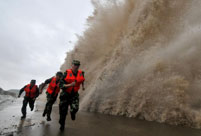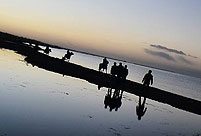The manners of Chinese tourists are always a hot topic during long holidays. In the just concluded National Day holidays, "uncivilized Chinese tourists" have been ushered into the spotlight once again.
Uncivilized behavior continued to make headlines in the seven-day holidays. At the memorable flag-raising ceremony at Tiananmen Square on October 1, 110,000 attendees left five tons of trash behind after showing their love and respect to the country. In Italy, Chinese tourists were spotted eating on the lawn in front of the famous Leaning Tower of Pisa, and the local police were reported to say that tourists from China regularly break the rules. In Jiuzhaigou, a famous natural resort located in China's Southwestern Sichuan Province, more than 4,000 tourists were stranded inside the scenic spot because some tourists forced themselves on to tour buses, which caused transportation paralysis.
Similar stories are testing the tolerance of public opinion almost every day. Each time Chinese tourists are reported to be "uncivilized," blame and criticism emerges. A report of The New York Times labeled Chinese tourists "the most resented tourists" this September.
It cannot be denied that Chinese tourists are doing an undesirable job in terms of their manners, and most criticisms over them hit home. But it will be more persuasive and objective if these voices can focus more on the vertical improvements Chinese tourists are making rather than indiscriminately seek a horizontal contrast with other countries' tourists.
It should be noted that China's tourism industry is not developing in a gradual way, but in a blowout manner. Growing wealth enables more Chinese people to seek leisure and fulfillment from traveling. Considering China's large population, an exponentially growing number of tourists is posing great challenges on many spheres of both domestic and foreign societies. Neither Chinese tourists nor the destination communities are ready to face these challenges.
Instead of putting energy into blaming and complaining, it would be more constructive if this "uncivilized behavior" can be viewed objectively with the considerations of elements such as cultural gaps and different lifestyles, which have caused many misunderstandings.
Chinese tourists need to be enlightened with the education of some basic and commonly recognized manners. But at the same time, their temporary problems shouldn't turn them into the synonym of "rudeness and lack of civilization."
China's booming tourist industry is beneficial to both China itself and international markets. But this reciprocal connection might be bottlenecked if a positive interaction system including patience, mutual understanding and cooperation cannot be established.
 2013 Colour Me Rad 5K run held in Canada
2013 Colour Me Rad 5K run held in Canada China's destroyer Qingdao sails out of Sydney Harbor
China's destroyer Qingdao sails out of Sydney Harbor Chinese tycoon aims to restore London's Crystal Palace
Chinese tycoon aims to restore London's Crystal Palace A staple of southern Chinese people
A staple of southern Chinese people Typhoon Fitow approaches China
Typhoon Fitow approaches China Tourists take pictures beside Qinghai Lake in Xining
Tourists take pictures beside Qinghai Lake in Xining New couples take wedding photos during holiday
New couples take wedding photos during holiday Serena Williams stumbles through to quarterfinals
Serena Williams stumbles through to quarterfinals Thailand Mobile Expo 2013 kicks off
Thailand Mobile Expo 2013 kicks off Photo collection of Chinese Navy
Photo collection of Chinese Navy Dense haze envelops N China
Dense haze envelops N China Twins Culture Festival kicks off in Beijing
Twins Culture Festival kicks off in Beijing UNESCO world heritage site: Montale Tower
UNESCO world heritage site: Montale Tower Egyptian protesters clash with police amid war anniv. celebration
Egyptian protesters clash with police amid war anniv. celebration Serena Williams wins second China Open title
Serena Williams wins second China Open titleDay|Week|Month